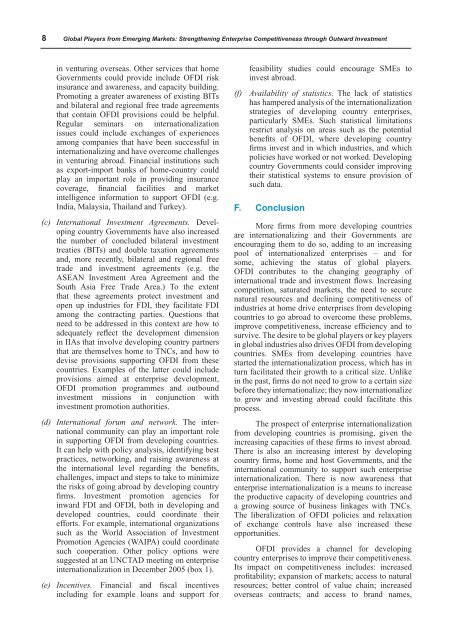Global Players from Emerging Markets: Strengthening ... - Unctad
Global Players from Emerging Markets: Strengthening ... - Unctad
Global Players from Emerging Markets: Strengthening ... - Unctad
You also want an ePaper? Increase the reach of your titles
YUMPU automatically turns print PDFs into web optimized ePapers that Google loves.
8 <strong>Global</strong> <strong>Players</strong> <strong>from</strong> <strong>Emerging</strong> <strong>Markets</strong>: <strong>Strengthening</strong> Enterprise Competitiveness through Outward Investment<br />
in venturing overseas. Other services that home<br />
Governments could provide include OFDI risk<br />
insurance and awareness, and capacity building.<br />
Promoting a greater awareness of existing BITs<br />
and bilateral and regional free trade agreements<br />
that contain OFDI provisions could be helpful.<br />
Regular seminars on internationalization<br />
issues could include exchanges of experiences<br />
among companies that have been successful in<br />
internationalizing and have overcome challenges<br />
in venturing abroad. Financial institutions such<br />
as export-import banks of home-country could<br />
play an important role in providing insurance<br />
coverage, financial facilities and market<br />
intelligence information to support OFDI (e.g.<br />
India, Malaysia, Thailand and Turkey).<br />
(c) International Investment Agreements. Developing<br />
country Governments have also increased<br />
the number of concluded bilateral investment<br />
treaties (BITs) and double taxation agreements<br />
and, more recently, bilateral and regional free<br />
trade and investment agreements (e.g. the<br />
ASEAN Investment Area Agreement and the<br />
South Asia Free Trade Area.) To the extent<br />
that these agreements protect investment and<br />
open up industries for FDI, they facilitate FDI<br />
among the contracting parties. Questions that<br />
need to be addressed in this context are how to<br />
adequately reflect the development dimension<br />
in IIAs that involve developing country partners<br />
that are themselves home to TNCs, and how to<br />
devise provisions supporting OFDI <strong>from</strong> these<br />
countries. Examples of the latter could include<br />
provisions aimed at enterprise development,<br />
OFDI promotion programmes and outbound<br />
investment missions in conjunction with<br />
investment promotion authorities.<br />
(d) International forum and network. The international<br />
community can play an important role<br />
in supporting OFDI <strong>from</strong> developing countries.<br />
It can help with policy analysis, identifying best<br />
practices, networking, and raising awareness at<br />
the international level regarding the benefits,<br />
challenges, impact and steps to take to minimize<br />
the risks of going abroad by developing country<br />
firms. Investment promotion agencies for<br />
inward FDI and OFDI, both in developing and<br />
developed countries, could coordinate their<br />
efforts. For example, international organizations<br />
such as the World Association of Investment<br />
Promotion Agencies (WAIPA) could coordinate<br />
such cooperation. Other policy options were<br />
suggested at an UNCTAD meeting on enterprise<br />
internationalization in December 2005 (box 1).<br />
(e) Incentives. Financial and fiscal incentives<br />
including for example loans and support for<br />
feasibility studies could encourage SMEs to<br />
invest abroad.<br />
(f) Availability of statistics. The lack of statistics<br />
has hampered analysis of the internationalization<br />
strategies of developing country enterprises,<br />
particularly SMEs. Such statistical limitations<br />
restrict analysis on areas such as the potential<br />
benefits of OFDI, where developing country<br />
firms invest and in which industries, and which<br />
policies have worked or not worked. Developing<br />
country Governments could consider improving<br />
their statistical systems to ensure provision of<br />
such data.<br />
F. Conclusion<br />
More firms <strong>from</strong> more developing countries<br />
are internationalizing and their Governments are<br />
encouraging them to do so, adding to an increasing<br />
pool of internationalized enterprises – and for<br />
some, achieving the status of global players.<br />
OFDI contributes to the changing geography of<br />
international trade and investment flows. Increasing<br />
competition, saturated markets, the need to secure<br />
natural resources and declining competitiveness of<br />
industries at home drive enterprises <strong>from</strong> developing<br />
countries to go abroad to overcome these problems,<br />
improve competitiveness, increase efficiency and to<br />
survive. The desire to be global players or key players<br />
in global industries also drives OFDI <strong>from</strong> developing<br />
countries. SMEs <strong>from</strong> developing countries have<br />
started the internationalization process, which has in<br />
turn facilitated their growth to a critical size. Unlike<br />
in the past, firms do not need to grow to a certain size<br />
before they internationalize; they now internationalize<br />
to grow and investing abroad could facilitate this<br />
process.<br />
The prospect of enterprise internationalization<br />
<strong>from</strong> developing countries is promising, given the<br />
increasing capacities of these firms to invest abroad.<br />
There is also an increasing interest by developing<br />
country firms, home and host Governments, and the<br />
international community to support such enterprise<br />
internationalization. There is now awareness that<br />
enterprise internationalization is a means to increase<br />
the productive capacity of developing countries and<br />
a growing source of business linkages with TNCs.<br />
The liberalization of OFDI policies and relaxation<br />
of exchange controls have also increased these<br />
opportunities.<br />
OFDI provides a channel for developing<br />
country enterprises to improve their competitiveness.<br />
Its impact on competitiveness includes: increased<br />
profitability; expansion of markets; access to natural<br />
resources; better control of value chain; increased<br />
overseas contracts; and access to brand names,

















